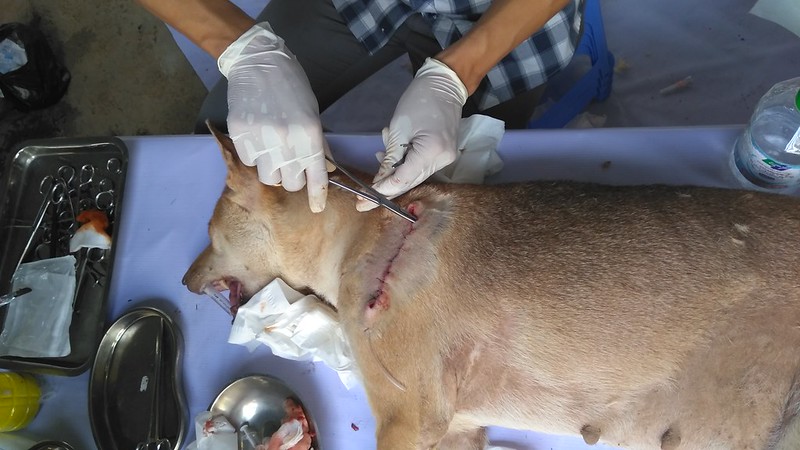ACPA helps provide medical care for confiscated dogs following the largest ever bust of a dog theft ring by Vietnamese police
26 September 2019
After a tip off to local authorities in Thanh Hoa Province (150km south of Hanoi) on September 15, 2019, police successfully carried out the largest ever bust of a dog theft ring, resulting in the seizure of 51 dogs. However, police struggled to care for the confiscated dogs, so the Asia Canine Protection Alliance (ACPA), of which Animals Asia is a member, stepped in to offer assistance.
Authorities arrested a total of 16 suspected gang members and questioned more than 40 suspects linked to the dog theft ring which was raided as part of an investigation into the thousands of dogs reported stolen in Thanh Hoa Province since the beginning of the year.
A local policeman said:
“This ring has operated for a long time, stealing many dogs and causing outrage among local people.”
The police publicised the bust throughout the province so that stolen dogs could be reunited with their families. So far 34 dogs have been reunited.
There were 17 dogs in need of care and shelter, of which one was isolated in intensive care, three were relatively healthy, and 13 were in need of veterinary treatment. The dog thieves stole the dogs using motorbikes, stun guns and shackles, often causing severe wounds to the neck, leading to serious pain and infections.
On September 18, representatives of the Asia Canine Protection Alliance (ACPA) were present at the scene of the confiscation and offered support for the injured dogs, ensuring that they received timely veterinary care. ACPA committed to covering the costs associated with the animals’ veterinary treatment, medicine, and neutering. In just two days, 13 wounded dogs were treated by veterinary experts. Dogs with painful open wounds were anesthetised during their procedures, given pain medication, and placed in separate kennels for treatment.
Tuan Bendixsen, of ACPA member organisation Animals Asia said:
“These arrests will hopefully make a big dent in the illegal dog meat trade in Thanh Hoa Province which has seen thousands of dogs stolen from their families just this year. Under Vietnamese law only thefts of property with a cash value of above $86US are treated as a criminal offence. As a result, individual dog thieves may only incur a small fine. The provincial police hope that this case will become a precedent, helping district police forces to take a stronger stance against dog theft.
“We’re working hard to encourage people to value these animals as sentient beings and companions who feel pain and suffer in the poorly regulated meat trade. We’re up against the perception that dog meat is a delicacy and will continue to highlight the horrible treatment the dogs receive before they arrive on someone’s plate.”
For dogs that have not been identified as belonging to a family, the Thanh Hoa Province Police have approved the proposal by ACPA that the dogs should be taken to their certified dog rescue centres where they can be nurtured back to health and readied for adoption.
Earlier in the week, Food Safety Management Board of Ho Chi Minh City urged locals to stop eating dog meat in an effort to improve Vietnam’s national image with tourists as well as warned the local community of the health risks posed by consuming the unregulated meat. This followed a similar call by the Hanoi People’s Committee last year.
FACTS
-
The Asia Canine Protection Alliance (ACPA) consists of four organizations: Animals Asia, Change for Animals Foundation, Humane Society International and FOUR PAWS. The ACPA Alliance was established to support the fight against illegal dog trafficking and eradicate rabies by 2020. Currently, ACPA works with the Department of Animal Health on initiatives related to the prevention of rabies, improving animal quarantine capacity, and supporting networks of dog and cat rescue centres throughout Vietnam.
-
ACPA estimates that five million dogs are killed for food in Vietnam every year.
-
An increasing proportion of dogs and cats used to supply the demand for dog meat are stolen pets, and this is quickly becoming a societal issue in Vietnam where the growing pet-owning and loving population is becoming frustrated with continued pet theft.
-
The large-scale movement of dogs of unknown health and vaccination status is in contravention to rabies control recommendations by leading animal and human health professionals.
BACK






